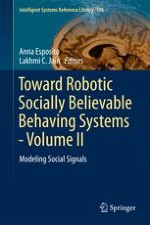2016 | OriginalPaper | Buchkapitel
3. Adaptive and Evolutive Algorithms: A Natural Logic for Artificial Mind
verfasst von : Mauro Maldonato, Silvia Dell’Orco
Erschienen in: Toward Robotic Socially Believable Behaving Systems - Volume II
Aktivieren Sie unsere intelligente Suche, um passende Fachinhalte oder Patente zu finden.
Wählen Sie Textabschnitte aus um mit Künstlicher Intelligenz passenden Patente zu finden. powered by
Markieren Sie Textabschnitte, um KI-gestützt weitere passende Inhalte zu finden. powered by
